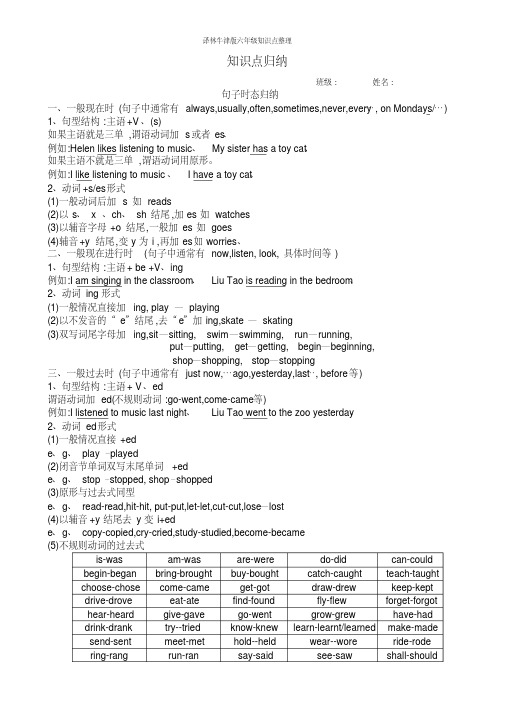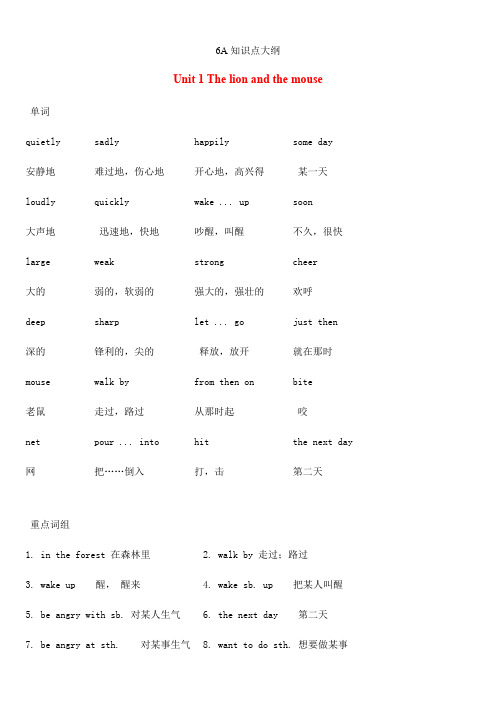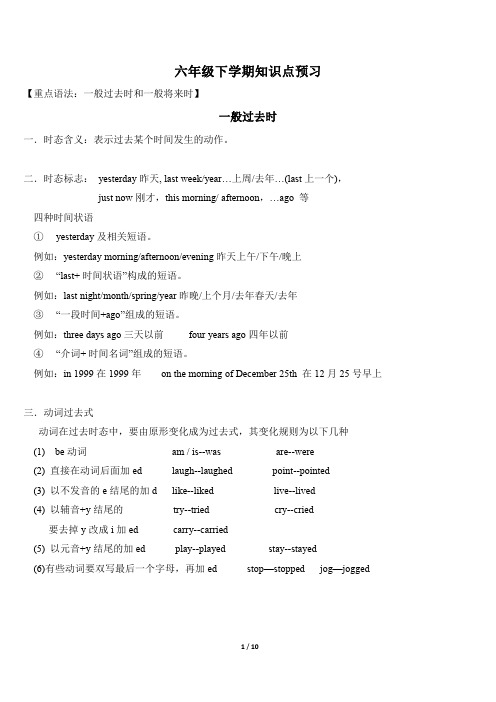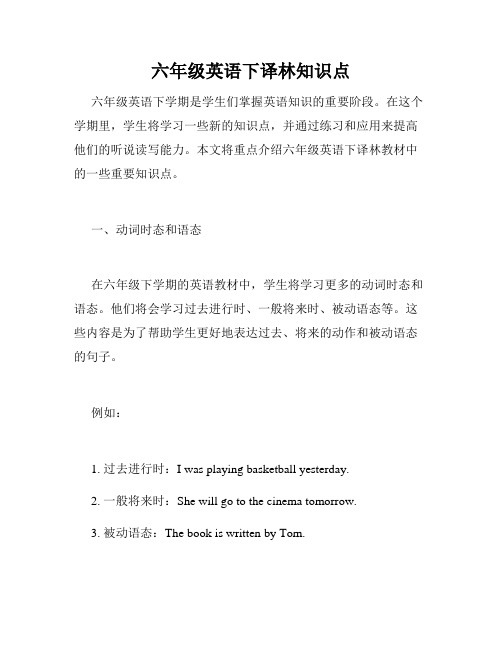六年级下册英语-全册知识点归纳 牛津译林版
译林版六年级下册英语全册知识点(word版)

6B Unit 1 The lion and the mouse 单元知识单词:mouse 老鼠large 大的strong 强大的,强壮的net 网quietly 小声地,安静地loudly 大声地bite 咬ask 问sharp 锋利的,尖的soon 不久,很快happily 开心地,高兴地cheer 欢呼weak 弱的,软弱的hit 打,击ground 地面,地上deep 深reach 够得着hole洞excitedly激动地finally 最后quickly快地sadly 难过地really 真正地bite——bit let—— let wake—— woke词组1.in the forest 在森林里rge and strong又大又壮3.walk by路过4.wake …up 唤醒5.be angry 生气6.want to eat the mouse想要吃老鼠7.some day 某一天8.so small and weak这么小和弱9.let the mouse go 让这只老鼠走开10.the next day 第二天11.catch the lion with a large net用一张大网抓住狮子12.bite the net with his sharp teeth用它的厉牙咬网13.get out from the net破网而出14.just then就在那时15.make a big hole in the net在网上做了一个大洞16.from then on从那时起17.become friends变成朋友18.help the lion get out帮助狮子逃脱19.say quietly平静地说ugh loudly大声地笑21.ask sadly伤心地问22.say happily高兴地说23.sweet shop甜品店24.be good at table tennis乒乓球打得好25.cheer for them loudly大声地为他们喝彩26.hit the ball hard 用力击球27.find a hole in the ground在地上发现一个洞28.too deep太深29.have an idea有一个主意(想法)30.bring some water quickly很快带来一些水31.look sad看起来伤心32.help him up 帮他上来33.become happy 变得开心34.like helping people喜欢帮助人ugh happily开心地大笑36.a happy boy 一个快乐地男孩37.run quickly 快速地跑38.cry sadly 悲伤地哭泣39.talk soon 再联系句子1.The lion was angry and wanted to eat the mouse.这只狮子很生气想要吃那只老鼠。
牛津译林版六年级英语下册全册各单元知识点汇总

Unit 1 The lion and the mouse 姓名________短语:1.in the forest 在森林里 rge and strong 又大又壮3. walk by 走过、路过4. wake... up 吵醒、叫醒5. some day 某一天6. be angry 生气7. say quietly 小声地说8.small and weak 弱小的9. laugh loudly大声地笑10.the next day 第二天12. a large net 一个大网13.get out 出来、出去14. bite… with 用……咬8.let…go 让…走15. bite the net with his sharp teeth 用他锋利的牙齿咬破网16.hit ..hard 使劲地打16. become friends 成为朋友17. laugh happily 开心地笑18. from then on 从那时起19.at night 在夜晚20. Aesop's Fables 伊索寓言21. Chinese idiom 成语故事22. It doesn't matter. 没关系。
23.many animal stories 许多动物故事24.play table tennis 打乒乓球25.be good at... 擅长于...26.cheer for 为...喝彩27.too excited 太兴奋8. too deep 太深28.hit the ball hard 猛力地怕打球29.pour into 把....倒入30.just then 就在那时31.make a big hole 钻了一个大洞13.in the hole 在洞里 4.in the net在网子上32.let the mouse go 让老鼠离开33.Here comes the lion.这里来了只狮子。
译林牛津版六年级知识点整理

知识点归纳班级: 姓名:句子时态归纳一、一般现在时(句子中通常有always,usually,often,sometimes,never,every…, on Mondays/…)1、句型结构:主语+V、(s)如果主语就是三单,谓语动词加s或者es、例如:Helen likes listening to music、My sister has a toy cat、如果主语不就是三单,谓语动词用原形。
例如:I like listening to music、I have a toy cat、2、动词+s/es形式(1)一般动词后加s 如reads(2)以s、x 、ch、sh 结尾,加es 如watches(3)以辅音字母+o 结尾,一般加es 如goes(4)辅音+y 结尾,变y为i ,再加es如worries、二、一般现在进行时(句子中通常有now,listen, look, 具体时间等)1、句型结构:主语+ be +V、ing例如:I am singing in the classroom、Liu Tao is reading in the bedroom、2、动词ing形式(1)一般情况直接加ing, play —playing(2)以不发音的“e”结尾,去“e”加ing,skate —skating(3)双写词尾字母加ing,sit—sitting, swim—swimming, run—running,put—putting, get—getting, begin—beginning,shop—shopping, stop—stopping三、一般过去时(句子中通常有just now,…ago,yesterday,last…, before等)1、句型结构:主语+ V、ed谓语动词加ed(不规则动词:go-went,come-came等)例如:I listened to music last night、Liu Tao went to the zoo yesterday、2、动词ed形式(1)一般情况直接+ede、g、play – played(2)闭音节单词双写末尾单词+ede、g、stop – stopped, shop – shopped(3)原形与过去式同型e、g、read-read,hit-hit, put-put,let-let,cut-cut,lose—lost(4)以辅音+y结尾去y变i+ede、g、copy-copied,cry-cried,study-studied,become-became(5)不规则动词的过去式is-was am-was are-were do-did can-could begin-began bring-brought buy-bought catch-caught teach-taughtchoose-chose come-came get-got draw-drew keep-keptdrive-drove eat-ate find-found fly-flew forget-forgothear-heard give-gave go-went grow-grew have-haddrink-drank try--tried know-knew learn-learnt/learned make-madesend-sent meet-met hold--held wear--wore ride-rodering-rang run-ran say-said see-saw shall-shouldsing-sang sit-sat sleep-slept speak-spoke spend-spentstand-stood sweep-swept swim-swam take-took teach-taught 四、一般将来时(句子中通常有tomorrow,next…,soon,this afternoon,this evening)谓语动词结构就是:be going to +do(表示计划、打算做…) 或者will +do(表示即将发生…)句型结构:主语+ be going to / will + V、原形例如: I am going to have an English lesson tomorrow、He will have an English lesson tomorrow、动词使用1、用动词原形(1)情态动词:can,can’t ,should,shouldn’t,must,mustn’t,could,couldn’t,will,won’t 后面用动词原形,(2)助动词do,don’t, does,doesn’t,did,didn’t后面用动词原形。
译林牛津版六年级知识点整理

知识点归纳班级:姓名:句子时态归纳一、一般现在时(句子中通常有always,usually,often,sometimes,never,every…, on Mondays/…)1、句型结构:主语+V.(s)如果主语是三单,谓语动词加s或者es.例如:Helen likes listening to music. My sister has a toy cat.如果主语不是三单,谓语动词用原形。
例如:I like listening to music. I have a toy cat.2、动词+s/es形式(1)一般动词后加s 如 reads(2)以s、 x 、ch、 sh 结尾,加es 如 watches(3)以辅音字母+o 结尾,一般加es 如 goes(4)辅音+y 结尾,变y为i ,再加es如worries.二、一般现在进行时(句子中通常有now,listen, look, 具体时间等)1、句型结构:主语+ be +V.ing例如:I am singing in the classroom. Liu Tao is reading in the bedroom.2、动词ing形式(1)一般情况直接加ing, play — playing(2)以不发音的“e”结尾,去“e”加ing,skate — skating(3)双写词尾字母加ing,sit—sitting, swim—swimming, run—running,put—putting, get—getting, begin—beginning,shop—shopping, stop—stopping三、一般过去时(句子中通常有just now,…ago,yesterday,last…, before等)1、句型结构:主语+ V.ed谓语动词加ed(不规则动词:go-went,come-came等)例如:I listened to music last night. Liu Tao went to the zoo yesterday.2、动词ed形式(1)一般情况直接+ede.g. play – played(2)闭音节单词双写末尾单词+ede.g. stop – stopped, shop – shopped(3)原形与过去式同型e.g. read-read,hit-hit, put-put,let-let,cut-cut,lose—lost(4)以辅音+y结尾去y变i+ede.g. copy-copied,cry-cried,study-studied,become-became(5四、一般将来时(句子中通常有tomorrow,next…,soon,this afternoon,this evening)谓语动词结构是:be going to +do(表示计划、打算做…)或者will +do(表示即将发生…)句型结构:主语+ be going to / will + V.原形例如: I am going to have an English lesson tomorrow. He will have an English lesson tomorrow.动词使用1、用动词原形(1)情态动词:can,can’t ,should,shouldn’t,must,mustn’t,could,couldn’t,will,won’t 后面用动词原形,(2)助动词do,don’t, does,doesn’t,did,didn’t后面用动词原形。
六年级下册英语-全册知识点归纳-牛津译林版

6A知识点大纲Unit 1 The lion and the mouse 单词quietly 安静地sadly难过地,伤心地happily开心地,高兴得some day某一天loudly 大声地quickly迅速地,快地wake ... up吵醒,叫醒soon不久,很快large 大的weak弱的,软弱的strong强大的,强壮的cheer欢呼deep 深的sharp锋利的,尖的let ... go释放,放开just then就在那时mouse 老鼠walk by走过,路过from then on从那时起bite咬net 网pour ... into把……倒入hit打,击the next day第二天重点词组1. in the forest 在森林里2. walk by 走过;路过3. wake up 醒,醒来4. wake sb. up 把某人叫醒5. be angry with sb. 对某人生气6. the next day 第二天7. be angry at sth. 对某事生气8. want to do sth. 想要做某事9. want sb. to do sth. 要某人做某事10. some day 某一天11. say quietly 小声地说12. sit quietly 静静地坐着13. laugh loudly 大声地笑14. let sb. do sth. 让某人做某事15. catch the lion with a large net 用一口大网捉住狮子16. bite the net with sharp teeth 用锋利的牙齿咬网17. ask sadly 难过地问,伤心地问18. just then 就在那时19. say happily 开心地说20. from then on 从那时起21. become friends 成为朋友22. say excitedly 兴奋地说,激动地说23. make a study plan 制定学习计划24. It doesn’t matter. 没关系。
牛津译林版英语六年级下册期末知识点复习(一般过去时和一般将来时)附练习含答案

六年级下学期知识点预习【重点语法:一般过去时和一般将来时】一般过去时一.时态含义:表示过去某个时间发生的动作。
二.时态标志:yesterday昨天,last week/year…上周/去年…(last上一个),just now刚才,this morning/afternoon,…ago等四种时间状语①yesterday及相关短语。
例如:yesterday morning/afternoon/evening昨天上午/下午/晚上②“last+时间状语”构成的短语。
例如:last night/month/spring/year昨晚/上个月/去年春天/去年③“一段时间+ago”组成的短语。
例如:three days ago三天以前four years ago四年以前④“介词+时间名词”组成的短语。
例如:in1999在1999年on the morning of December25th在12月25号早上三.动词过去式动词在过去时态中,要由原形变化成为过去式,其变化规则为以下几种(1)be动词am/is--was are--were(2)直接在动词后面加ed laugh--laughed point--pointed(3)以不发音的e结尾的加d like--liked live--lived(4)以辅音+y结尾的try--tried cry--cried要去掉y改成i加ed carry--carried(5)以元音+y结尾的加ed play--played stay--stayed(6)有些动词要双写最后一个字母,再加ed stop—stopped jog—jogged(7)不规则变化(为过去时态中变化的难点,也是考试的重点)原形过去式原形过去式原形过去式do did go went say saidtell told can could get got have had give gave see saw become became fly flew bring brought eat ate take took find found lose lost stop stopped sing sang make made run ran swim swam hold held come came catch caught wear wore read read draw drew write wrote buy bought mean meant drink drank smell smelt keep kept put put throw threw slip slipped feel felt cut cut drive drove四.结构1.肯定句:主语+动词过去式2.一般疑问句:(1)句中含有be动词,将be动词提到句首,Was/Were+主语+……?Yes,…was/were./No,…wasn’t/weren’t.(2)句中无be动词,在句首加Did,动词变原形,Did+主语+动词原形……?Yes,…did./No,…didn’t.3.否定句的修改方法(1)句中含有be动词,直接在be动词后面加not,主语+wasn’t/weren’t…(2)句中无be动词,在动词前加didn’t,动词变原形,主语+didn’t+动词原形4.特殊疑问句:What did+主语+do?一般过去时练习一、请用正确动词形式填空。
译林牛津英语六年级下册第一单元知识点复习与习题

译林牛津英语六年级下册第一单元知识点复习与习题-CAL-FENGHAI.-(YICAI)-Company One16下 Unit 1 The lion and the mouse知识点梳理一词组1. in the forest 在森林里2. walk by 走过;路过3. wake up 醒,醒来4. wake sb up 把某人叫醒5. be angry with sb 对某人生气6. the next day 第二天7. be angry at sth 对某事生气 8. want to do sth 想要做某事9. want sb to do sth 要某人做某事 10. some day 某一天11. say quietly 小声地说 12. sit quietly 静静地坐着13. laugh loudly 大声地笑 14. let sb do sth 让某人做某事15. catch the lion with large net 用一口大网捉住狮子16. bite the net with sharp teeth 用锋利的牙齿咬网17. ask sadly 难过地问,伤心地问 18. just then 就在那时19. say happily 开心地说, 20. from then on 从那时起21. become friends 成为朋友 22. say excitedly 兴奋地说,激动地说23. make a study plan 制定学习计划24. It doesn’t matter. 没关系。
25. the boy over there 那边的那个男孩26. play table tennis happily 开心地打乒乓球27. cheer for sb loudly 大声地为某人欢呼28. be excited at / about… 对……很兴奋// 激动29. in the ground 在地下 30. reach the apple 够得着那个苹果31. reach the park 到达公园 32. have an idea 有一个主意33. bring some water quickly 很快拿来水34. pour…into….把……倒入……35. Well done. 干得很好。
六年级英语下译林知识点

六年级英语下译林知识点六年级英语下学期是学生们掌握英语知识的重要阶段。
在这个学期里,学生将学习一些新的知识点,并通过练习和应用来提高他们的听说读写能力。
本文将重点介绍六年级英语下译林教材中的一些重要知识点。
一、动词时态和语态在六年级下学期的英语教材中,学生将学习更多的动词时态和语态。
他们将会学习过去进行时、一般将来时、被动语态等。
这些内容是为了帮助学生更好地表达过去、将来的动作和被动语态的句子。
例如:1. 过去进行时:I was playing basketball yesterday.2. 一般将来时:She will go to the cinema tomorrow.3. 被动语态:The book is written by Tom.通过学习这些时态和语态,学生将能够更准确地描述过去和将来的动作,并能够灵活运用被动语态。
二、比较级和最高级在六年级下学期的英语教材中,学生还将学习更多的形容词和副词的比较级和最高级形式。
他们将学会如何比较两个事物的差异,并找出最高级形式来描述某个事物的最高程度。
例如:1. 比较级:My dog is bigger than yours.2. 最高级:She is the tallest girl in our class.通过学习比较级和最高级,学生将能够更好地描述事物的大小、程度和属性,并能够进行比较和分类。
三、时间状语从句在六年级下学期的英语教材中,学生将开始学习时间状语从句。
他们将学会如何使用时间状语从句来描述事件的发生时间。
例如:1. When I was young, I liked playing football.2. After she finishes her homework, she can go out to play.通过学习时间状语从句,学生将能够更准确地描述事件发生的时间顺序,并能够更好地理解复杂句子的结构。
四、固定搭配和常用短语在六年级下学期的英语教材中,学生还将学习一些固定搭配和常用短语。
- 1、下载文档前请自行甄别文档内容的完整性,平台不提供额外的编辑、内容补充、找答案等附加服务。
- 2、"仅部分预览"的文档,不可在线预览部分如存在完整性等问题,可反馈申请退款(可完整预览的文档不适用该条件!)。
- 3、如文档侵犯您的权益,请联系客服反馈,我们会尽快为您处理(人工客服工作时间:9:00-18:30)。
六年级下册英语-全册知识点归纳牛津译林版6A知识点大纲Unit 1 The lion and the mouse单词quietly 安静地sadly难过地,伤心地happily开心地,高兴得some day某一天loudly 大声地quickly迅速地,快地wake ... up吵醒,叫醒soon不久,很快large 大的weak弱的,软弱的strong强大的,强壮的cheer欢呼deep 深的sharp锋利的,尖的let ... go释放,放开just then就在那时mouse 老鼠walk by走过,路过from then on从那时起bite咬net 网pour ... into把……倒入hit打,击the next day第二天重点词组1. in the forest 在森林里2. walk by 走过;路过3. wake up醒,醒来4. wake sb. up把某人叫醒5. be angry with sb. 对某人生气6. the next day第二天7. be angry at sth.对某事生气8. want to do sth. 想要做某事9. want sb. to do sth. 要某人做某事10. some day某一天11. say quietly 小声地说12. sit quietly 静静地坐着13. laugh loudly 大声地笑14. let sb. do sth. 让某人做某事15. catch the lion with a large net 用一口大网捉住狮子16. bite the net with sharp teeth 用锋利的牙齿咬网17. ask sadly 难过地问,伤心地问18. just then 就在那时19. say happily 开心地说20. from then on从那时起21. become friends 成为朋友22. say excitedly兴奋地说,激动地说23. make a study plan 制定学习计划24. It doesn’t matter. 没关系。
25. the boy over there 那边的那个男孩26. play table tennis happily开心地打乒乓球27. cheer for sb. loudly 大声地为某人欢呼28. be excited at / about…对……很兴奋/激动29. in the ground 在地下30. reach the apple 够得着那个苹果31. reach the park 到达公园32. have an idea有一个主意33. bring some water quickly很快拿来水34. pour…into….把……倒入……35. Well done. 干得很好。
做的不错。
36. so many balls 如此多的球37. so much bread 如此多的面包38. take … to… 把…….带到…….39. become happy 变得很开心40. get out 出来,出去重点句型1.The lion was angry and wanted to eat the mouse.这只狮子很生气想要吃那只老鼠。
2.The lion bit the net with his sharp teeth.那只狮子用它的厉牙咬那个网。
3.From then on, the lion and the mouse become friends.从那以后,这只狮子和那只老鼠成了朋友。
4.The next day, two men caught the lion with a large net.第二天,两个男人用一张大网抓住了那只狮子。
5.The lion bit the net with his sharp teeth, but that did not help.那只狮子用他的厉牙咬网,但是那无济于事。
6.Here comes the lion.狮子来了。
7.One day, a mouse walked by and woke the lion up.一天,一只老鼠从狮子身边经过,弄醒了狮子。
8.The mouse said quietly.老鼠小声地说。
9.“How can I get out ?” asked the lion sadly.“ 我怎么能出去呢?”狮子难过地问。
10.Soon, the mouse made a big hole in the net with his teeth.很快,老鼠用他的牙齿把网咬了一个大洞。
语法1、常见副词well:study well学习好skate well滑冰好(注: well若表示形容词,则意思为身体好)fast:run fast跑得快swim fast游泳快loudly:laugh loudly大声得笑speak loudly大声地讲sadly:ask sadly伤心地问cry loudly伤心地哭happily:sing happily开心地唱talk happily开心的谈话carefully: listen carefully认真地听walk carefully小心地走angrily:ask angrily愤怒地问quietly:do one’s homework quietly安静地做作业sleep quietly安静地睡quickly:bring some water quickly迅速地拿些水来beautifully: dance beautifully唱歌唱得美★系表结构:(注意不用副词)be, feel, look, sound, smell, become, keep +形容词★fast ,hard ,high,early,late,形容和副词同形2、一般过去式常用的时间状语ago / long long ago / yesterday / the day before yesterday in 2014 / just now(刚才) /at the age of 5(在五岁时) / once upon a time从前/ one day / last week, year, night, month, from then on3、speak,talk,say,tell区别speak强调方式;say强调内容;tell后一定要加人或讲的内容;talk强调连续说Unit 2 Good habit单词late 迟,晚tidy干净的,整齐的bad不好的,坏的last night昨夜sleepy困的,困倦的finish完成go into走进,走入never从不fast 快地slowly慢速地badly差地,不好habit习惯put ... in order把……整理得井井有条重点词组1. many good habits 很多好习惯2. get up early 早起3. go to bed late 晚睡4. brush one’s teeth 刷牙5. put sth. in order 把东西摆放有序6. finish one’s homework完成家庭作业7. listen to the teacher 听老师的话8. at school 在学校9. keep the room clean and tidy 保持房间干净整洁10. do well 干得好11. some bad habits 一些坏习惯12. feel sleepy 感到困倦13. know sb. well 对某人很了解14. walk fast 快速地走15. Pick one! 选一个16. show sb. around sp. 带某人参观某地17. go into 进入重点句型语法副词的分类(1) 时间副词:常见的有now, then, soon, ago, lately, later, before, early, today,1. He has many good habits. 他有许多好习惯。
2.He gets up early in the morning and never goes to bed late. 他早上早起,从不晚睡。
3. He brushes his teeth in the morning and before bedtime. 他早上和睡前刷牙。
4.At home, Wang Bing always puts his things in order. 在家,王兵总是把他的东西摆放有序。
5. He usually finishes his homework before dinner. 他经常在晚餐前晚餐作业。
6. He listens to his teachers at school. 他在学校听老师们的话。
7. He also does well at home. 他在家也做得很好。
8. He keeps his room clean and tidy. 他保持他的房间干净和整洁。
9. He also helps his parents. 他也帮他的父母。
10.He often does his homework late at night and does not go to bed early. 他经常晚做作业,晚上不早睡。
11 He sometimes feels sleepy in the morning. 有时早上他感到困倦。
12 Wang Bing knows Liu Tao well. 王兵对刘涛很了解。
13 Did you go to bed late last night? 你昨天晚上睡觉晚吗? 14 I’m not sleepy. I can walk fast. 我不困,我可以走得很快。
15 You shouldn’t go to bed late, Liu Tao. 刘涛,你不应该晚睡。
16 Let me show you around our house. 让我带你参加一下我们的房子。
17 They go into the living room. 他们走进客厅。
18 They see a lot of books and toys on the floor. 他们看见很多书和玩具在地上。
19 Whose bedroom is this? 这是谁的房间? 20 It’s my brother’s. 是我弟弟的。
21.You should put your books and toys in order. 你应该把你的书和玩具摆放有序。
